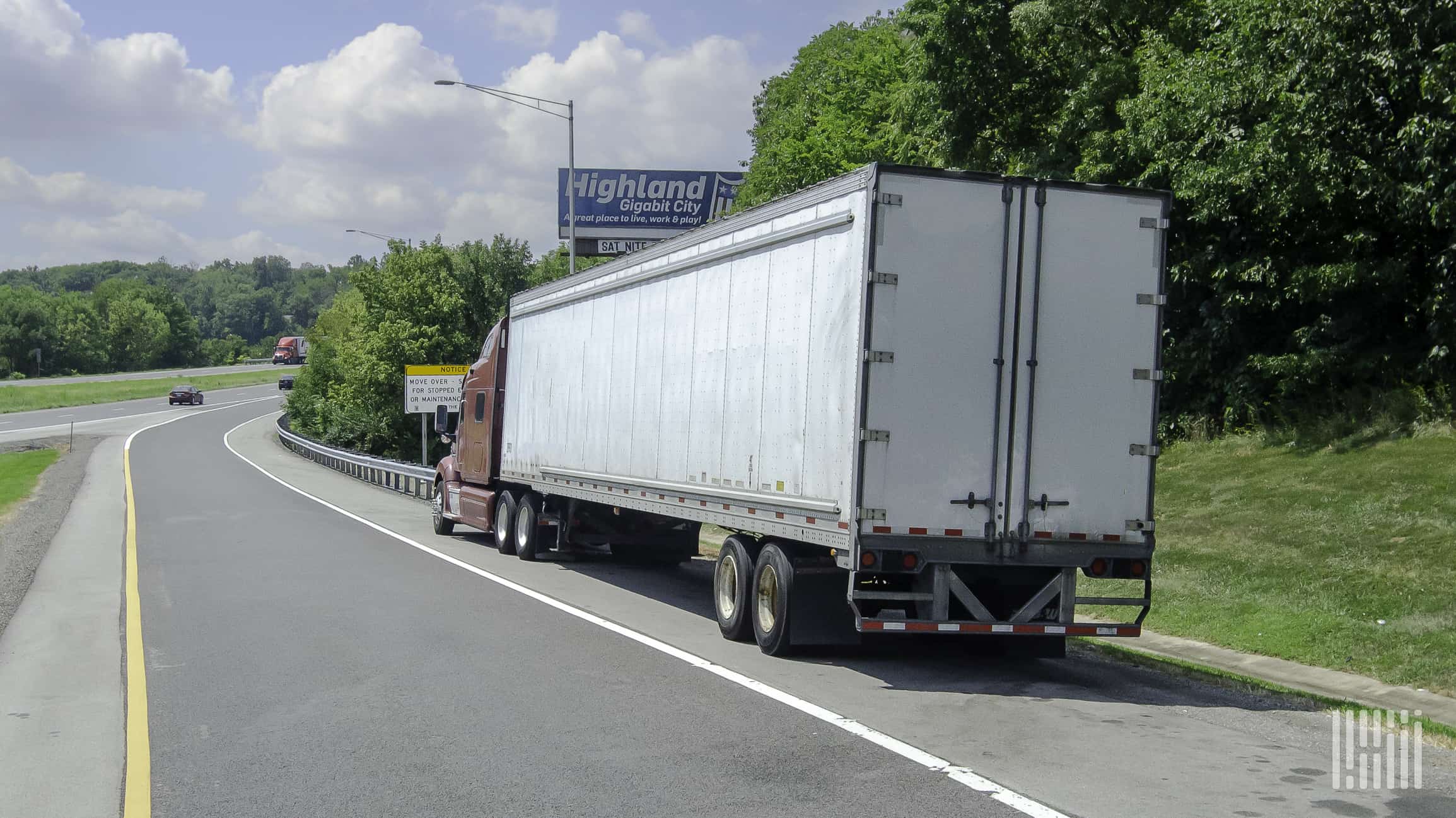About a dozen different trailer types are used by the trucking industry today. Each one provides a different level of protection for the cargo inside. A few examples are flatbeds, lowboys, reefers, step decks, and dry vans. In this article, we’ll explore dry vans specifically. So, what is a dry van? A dry van is an enclosed, sealed trailer that protects cargo from the elements outside. You can think of a dry van as a big, empty box. They are the most common type of trailer used in shipping today.
How Does Dry Van Trucking Work?
When you order products online, they are typically shipped in a dry van. Any cargo that doesn’t need refrigeration can be shipped this way.
Shippers choose dry van trucking because it is versatile and secure. It protects their cargo from the wind, weather, and other elements. So, how does dry van trucking work?
It’s usually a simple process. Most shippers use approved brokers or load boards to schedule a shipment. Truckers also use these methods to find loads and avoid deadhead runs or layover time.
If you’re not familiar with dry van shipping, you may have several more questions. We’ll dive into some of the most common ones below.
What Is a Dry Van Truck?
The answer to the question, “What is a dry van truck?” is quite simple. A dry van is a semi truck that hauls an enclosed trailer. The trailers vary in length, and most of them have a set of doors at the back. Dry van trucks are popular because they can haul a variety of products.
Why Is It Called a Dry Van?
A dry van is essentially a large, secure, mobile box. But why is it called a dry van? Well, because the outside covering is strong and weather-resistant in order to keep cargo dry.
The name also refers to the type of cargo. For instance, temperature-sensitive freight is referred to as wet goods. Wet goods usually require a refrigerated van or a reefer. Dry vans haul non-perishables.
What Are Dry Van Services?
Since dry van shipping is so widely used, the trucking industry stays busy. And that’s great for their bottom line!
So, what are dry van services? The short answer is that these services center around the transportation of goods in a sealed, protective trailer.
What Can be Hauled in Dry Van?
Many products are non-perishable and are often paletted or boxed for shipping. But what can be hauled in a dry van? Common shipments include the following:
- Equipment and machinery
- Building materials
- Household goods like furniture and electronics
- Retail goods and non-perishables such as boxed goods
- Clothing and fabrics
- Automobile parts and products
- Healthcare equipment
- Alcoholic beverages
- Books and magazines
Anything non-perishable can be shipped in a dry van, but size and weight will be taken into account.
How Much Weight Can a Dry Van Haul?
The weight capacity differs, depending on the length and height of the trailer. For example, a 53’ trailer can haul up to 45,000 pounds. A 48’ dry van can haul up to 147,000 pounds. A 28’ can haul about 22,500 pounds. Small box trucks can accommodate loads of about 10,000 pounds.
Dry Van Dimensions
Dry vans vary in dimension to accommodate the shipper’s needs. Length and height vary, but width is more standardized. The most commonly used sizes are:
53’ Trailers
A 53’ trailer is the most common type of dry van on the road today. The exterior dimensions are 53’ x 8’6” x 8’6”. These trailers can haul up to 26 pallets.
48’ Trailers
The exterior dimensions of a 48’ semi-trailer are 48’ x 8’5” x 13’6”. These trailers can haul about 24 pallets that are 48” x 48” in size. The maximum weight it can haul is about 147,000 pounds.
28’ Trailers
Known as “pup trailers,” 28’ trailers measure 28’ x 8’ x 9’. They accommodate up to 22,500 pounds and 14 pallet positions.
Box Truck
Also called straight trucks, the trailers measure 24’ x 8’ x 6’. They can carry loads up to 10,000 pounds.
Advantages of Dry Van Trucking
Dry van trucking is popular for a good reason. They are versatile, which provides several benefits for carriers and shippers, including:
- The ability to secure cargo
- Full trailers can be dropped
- Trailer and dock heights match
- Affordability
- Protection from the elements
- Can be used for a variety of cargo
With more people shopping online today, dry van shipping is a growing business.
Disadvantages of Dry Van Trucking
All shipping methods present their own set of disadvantages, and they will depend on the shipper’s needs and preferences.
Here are a few drawbacks to dry van trucking:
- Rear unloading is the only option
- Trucks are not temperature-controlled
- May need to use load boards to schedule a trailer
- Trailers have less capacity than flatbeds
- Heavy loads can damage the wood flooring
Despite the few disadvantages, dry van shipping is an efficient, affordable method for moving goods.
What’s Better: A Flatbed or Dry Van?
The decision to ship by flatbed vs. dry van is a tough one in some instances. A shipper must weigh the risks of damage to their cargo if a flatbed is used.
Flatbed trailers are versatile. The open sides and back facilitate easier loading and unloading. One downside is they don’t protect cargo from the elements.
Dry vans are fully enclosed, so unloading and loading are a bit more tricky than they would be with a flatbed. However, most dry vans can be backed to a loading dock, where forklifts can easily access the load. Determining which method is better depends on the type of cargo and the size of the load.
FAQ
Unladen dry van trailers usually weigh about 10,000 pounds.
The height of a dry van trailer varies depending on its length and width but can range from 13’6” to 6’.
Dry van trailer width averages 8’, regardless of the length or height of the trailer.
Sign up for a FreightWaves e-newsletter to stay informed of all news and trends impacting supply chain careers and operations.



